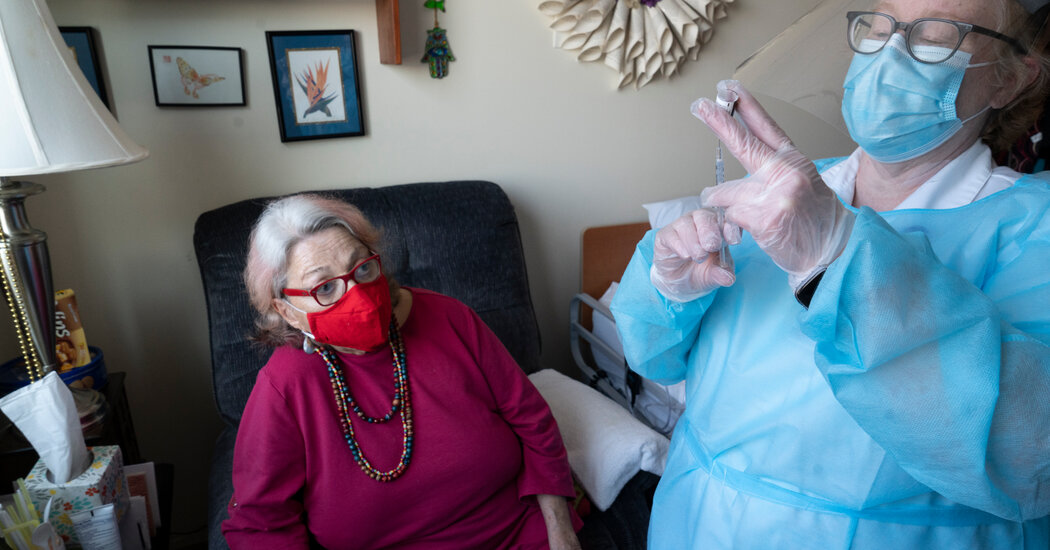
New York fears “starvation” for the vaccine, just as the launch of the vaccine accelerates
But with the opening of those new sites, the supply of doses directed to some hospitals appeared to dwindle. Many hospitals have recently started vaccinating their patients.
As of early Friday, New York City reported that it had received 800,500 doses, of which 337,518 vaccines had been administered. But city officials said about 100,000 of the doses received were for nursing homes, and about 200,000 would be used as second doses.
So, the actual number of doses available for people who are first vaccinated is lower.
The city is increasing the daily vaccination rate. From Monday to Thursday this week, The city administers approximately 120,000 doses.
“The growing problem now is not having enough supplies of the vaccine to keep up with the first appointments, let alone the second appointments,” said Mr. de Blasio on Friday.
In the first month of application in New York, Mr. Cuomo severely limited eligibility for healthcare workers and nursing home residents, and imposed A jungle of regulations caused vaccinations to progress more slowly Than expected. Many of the doses remained unused in the freezers for weeks. Under pressure to speed things up, Mr. Cuomo caved in, opening eligibility to large classes of public sector employees, essential workers, and anyone over the age of 65. Within days, the number of eligible New Yorkers doubled.
Covid-19 Vaccines ›
Answers to your questions about the vaccine
While the exact order of vaccine recipients may vary by state, most medical workers and residents are likely to put long-term care facilities first. If you want to understand how to make this decision, This article will help.
Life will return to normal only when society as a whole receives adequate protection against Coronavirus. Once countries authorize the vaccine, they will only be able to vaccinate a small percentage of their citizens, at most, in the first two months. The unvaccinated majority will still be susceptible to infection. An increasing number of coronavirus vaccines are showing strong protection against infection. But it is also possible for people to spread the virus without knowing they are infected because they only have mild symptoms or have no symptoms at all. Scientists do not yet know whether vaccines also prevent transmission of the Corona virus. So for now, even people who have been vaccinated will need to wear masks, avoid indoor crowds, etc. Once enough people are vaccinated, it will become very difficult for the Coronavirus to find vulnerable people. Depending on how quickly we achieve this goal as a society, life may begin to approach something as usual by the fall of 2021.
Yes, but not forever. The two vaccines likely to be licensed this month clearly protect people from contracting the Covid-19 virus. But the clinical trials that presented these results were not designed to determine whether vaccinated people could still spread the coronavirus without showing symptoms. This is still a possibility. We know that people naturally infected with the coronavirus can spread it while not experiencing any cough or other symptoms. Researchers will study this question more intensively as vaccines are introduced. In the meantime, even people who have been vaccinated will need to think of themselves as potential spreaders.
The Pfizer and BioNTech vaccine are given as an injection into the arm, like other standard vaccines. The injections will not differ from the ones you had before. Tens of thousands of people have already received vaccinations, and none have reported any serious health problems. But some experienced short-term discomfort, including aches and flu-like symptoms that usually lasted for a day. People will likely need to plan to take a day off work or school after the second shot. Although these trials are not fun, they are a good sign: they are the result of your immune system facing the vaccine and developing a strong response that provides long-lasting immunity.
No. Moderna and Pfizer vaccines use a genetic molecule to activate the immune system. This molecule, known as mRNA, is ultimately destroyed by the body. The mRNA is packaged into an oily bubble that can fuse into the cell, allowing the molecule to slide into it. The cell uses mRNA to make proteins from the coronavirus, which can stimulate the immune system. At any given moment, each of our cells may contain hundreds of thousands of messenger RNA molecules, which they produce in order to make their own proteins. Once these proteins are synthesized, our cells shredder messenger RNA using special enzymes. The messenger RNA molecules made by our cells can survive in just minutes. The mRNA in vaccines is designed to withstand cell enzymes for a little longer, so that cells can produce additional viral proteins and stimulate a stronger immune response. But mRNA can persist for a few days at most before it is destroyed.
There was no adequate vaccine for most of them. On Friday, Mr Cuomo again blamed the federal government for slow delivery of vaccines, adding that the Trump administration’s recommendation for expanded eligibility had exacerbated frustrations and shortages.
The governor said, “They have increased eligibility.” “They did not increase the offer.”
State officials also say they are not sure how many doses will be available week to week. Mark Polloncars, a Democrat who is county manager in Erie County, which includes Buffalo, the state’s second-largest city, said Thursday that the county received about 7,500 doses from the state last week and about 5,300 doses this week, including a batch from a district hospital.

“Analist. Schepper. Zombiefanaat. Fervente reisjunkie. Popcultuurexpert. Alcoholfan.”
